Exercise 5.3
1. What could be the possible ‘one’s’ digits of the square root of each of the following numbers?
i. 9801
ii. 99856
iii. 998001
iv. 657666025
Solution:
i. We know that the unit’s digit of the square of a number having digit as unit’s
place 1 is 1 and also 9 is 1[92=81 whose unit place is 1].
∴ Unit’s digit of the square root of number 9801 is equal to 1 or 9.
ii. We know that the unit’s digit of the square of a number having digit as unit’s
place 6 is 6 and also 4 is 6 [62=36 and 42=16, both the squares have unit digit 6].
∴ Unit’s digit of the square root of number 99856 is equal to 6.
iii. We know that the unit’s digit of the square of a number having digit as unit’s
place 1 is 1 and also 9 is 1[92=81 whose unit place is 1].
∴ Unit’s digit of the square root of number 998001 is equal to 1 or 9.
iv. We know that the unit’s digit of the square of a number having digit as unit’s
place 5 is 5.
∴ Unit’s digit of the square root of number 657666025 is equal to 5.
2. Without doing any calculation, find the numbers which are surely not perfect squares.
i. 153
ii. 257
iii. 408
iv. 441
Solution:
We know that natural numbers ending with the digits 0, 2, 3, 7 and 8 are not perfect square.
i. 153⟹ Ends with 3.
∴, 153 is not a perfect square
ii. 257⟹ Ends with 7
∴, 257 is not a perfect square
iii. 408⟹ Ends with 8
∴, 408 is not a perfect square
iv. 441⟹ Ends with 1
∴, 441 is a perfect square.
3. Find the square roots of 100 and 169 by the method of repeated subtraction.
Solution:
100
100 – 1 = 99
99 – 3 = 96
96 – 5 = 91
91 – 7 = 84
84 – 9 = 75
75 – 11 = 64
64 – 13 = 51
51 – 15 = 36
36 – 17 = 19
19 – 19 = 0
Here, we have performed subtraction ten times.
∴ √100 = 10
169
169 – 1 = 168
168 – 3 = 165
165 – 5 = 160
160 – 7 = 153
153 – 9 = 144
144 – 11 = 133
133 – 13 = 120
120 – 15 = 105
105 – 17 = 88
88 – 19 = 69
69 – 21 = 48
48 – 23 = 25
25 – 25 = 0
Here, we have performed subtraction thirteen times.
∴ √169 = 13
4. Find the square roots of the following numbers by the Prime Factorisation Method.
i. 729
ii. 400
iii. 1764
iv. 4096
v. 7744
vi. 9604
vii. 5929
viii. 9216
ix. 529
x. 8100
Solution:
i )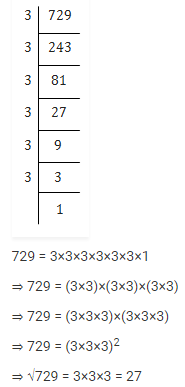
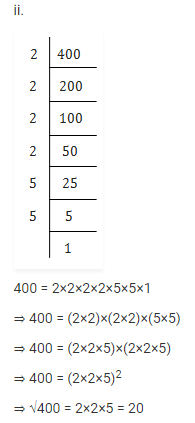
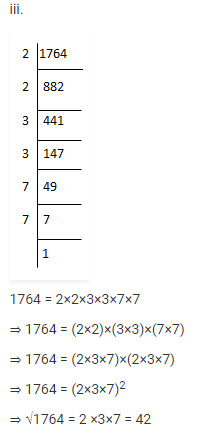

4096 = 2×2×2×2×2×2×2×2×2×2×2×2
⇒ 4096 = (2×2)×(2×2)×(2×2)×(2×2)×(2×2)×(2×2)
⇒ 4096 = (2×2×2×2×2×2)×(2×2×2×2×2×2)
⇒ 4096 = (2×2×2×2×2×2)2
⇒ √4096 = 2×2×2 ×2×2×2 = 64
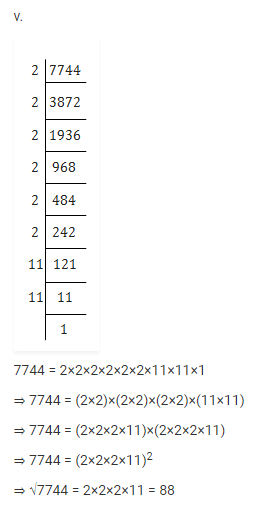
vi.

5929 = 7×7×11×11
⇒ 5929 = (7×7)×(11×11)
⇒ 5929 = (7×11)×(7×11)
⇒ 5929 = (7×11)2
⇒ √5929 = 7×11 = 77
viii.


8100 = 2×2×3×3×3×3×5×5×1
⇒ 8100 = (2×2) ×(3×3)×(3×3)×(5×5)
⇒ 8100 = (2×3×3×5)×(2×3×3×5)
⇒ 8100 = 90×90
⇒ 8100 = (90)2
⇒ √8100 = 90
5. For each of the following numbers, find the smallest whole number by which it should be multiplied so as to get a perfect square number. Also find the square root of the square number so obtained.
i. 252
ii. 180
iii. 1008
iv. 2028
v. 1458
vi. 768
Solution:
i.

1764 = 2×2×3×3×7×7
⇒ 1764 = (2×2)×(3×3)×(7×7)
⇒ 1764 = 22×32×72
⇒ 1764 = (2×3×7)2
⇒ √1764 = 2×3×7 = 42
ii.

900 = 2×2×3×3×5×5×1
⇒ 900 = (2×2)×(3×3)×(5×5)
⇒ 900 = 22×32×52
⇒ 900 = (2×3×5)2
⇒ √900 = 2×3×5 = 30
iii.

1008 = 2×2×2×2×3×3×7
= (2×2)×(2×2)×(3×3)×7
Here, 7 cannot be paired.
∴ We will multiply 1008 by 7 to get perfect square.
New number = 1008×7 = 7056

7056 = 2×2×2×2×3×3×7×7
⇒ 7056 = (2×2)×(2×2)×(3×3)×(7×7)
⇒ 7056 = 22×22×32×72
⇒ 7056 = (2×2×3×7)2
⇒ √7056 = 2×2×3×7 = 84
iv.

2028 = 2×2×3×13×13
= (2×2)×(13×13)×3
Here, 3 cannot be paired.
∴ We will multiply 2028 by 3 to get perfect square. New number = 2028×3 = 6084

6084 = 2×2×3×3×13×13
⇒ 6084 = (2×2)×(3×3)×(13×13)
⇒ 6084 = 22×32×132
⇒ 6084 = (2×3×13)2
⇒ √6084 = 2×3×13 = 78
v.

1458 = 2×3×3×3×3×3×3
= (3×3)×(3×3)×(3×3)×2
Here, 2 cannot be paired.
∴ We will multiply 1458 by 2 to get perfect square. New number = 1458 × 2 = 2916

2916 = 2×2×3×3×3×3×3×3
⇒ 2916 = (3×3)×(3×3)×(3×3)×(2×2)
⇒ 2916 = 32×32×32×22
⇒ 2916 = (3×3×3×2)2
⇒ √2916 = 3×3×3×2 = 54
vi.

768 = 2×2×2×2×2×2×2×2×3
= (2×2)×(2×2)×(2×2)×(2×2)×3
Here, 3 cannot be paired.
∴ We will multiply 768 by 3 to get perfect square.
New number = 768×3 = 2304

2304 = 2×2×2×2×2×2×2×2×3×3
⇒ 2304 = (2×2)×(2×2)×(2×2)×(2×2)×(3×3)
⇒ 2304 = 22×22×22×22×32
⇒ 2304 = (2×2×2×2×3)2
⇒ √2304 = 2×2×2×2×3 = 48
6. For each of the following numbers, find the smallest whole number by which it should be divided so as to get a perfect square. Also find the square root of the square number so obtained.
i. 252
ii. 2925
iii. 396
iv. 2645
v. 2800
vi. 1620
Solution:
i.

252 = 2×2×3×3×7
= (2×2)×(3×3)×7
Here, 7 cannot be paired.
∴ We will divide 252 by 7 to get perfect square. New number = 252 ÷ 7 = 36

36 = 2×2×3×3
⇒ 36 = (2×2)×(3×3)
⇒ 36 = 22×32
⇒ 36 = (2×3)2
⇒ √36 = 2×3 = 6
ii.

2925 = 3×3×5×5×13
= (3×3)×(5×5)×13
Here, 13 cannot be paired.
∴ We will divide 2925 by 13 to get perfect square. New number = 2925 ÷ 13 = 225

225 = 3×3×5×5
⇒ 225 = (3×3)×(5×5)
⇒ 225 = 32×52
⇒ 225 = (3×5)2
⇒ √36 = 3×5 = 15
iii.

396 = 2×2×3×3×11
= (2×2)×(3×3)×11
Here, 11 cannot be paired.
∴ We will divide 396 by 11 to get perfect square. New number = 396 ÷ 11 = 36

36 = 2×2×3×3
⇒ 36 = (2×2)×(3×3)
⇒ 36 = 22×32
⇒ 36 = (2×3)2
⇒ √36 = 2×3 = 6
iv.

2645 = 5×23×23
⇒ 2645 = (23×23)×5
Here, 5 cannot be paired.
∴ We will divide 2645 by 5 to get perfect square.
New number = 2645 ÷ 5 = 529

529 = 23×23
⇒ 529 = (23)2
⇒ √529 = 23
v.

2800 = 2×2×2×2×5×5×7
= (2×2)×(2×2)×(5×5)×7
Here, 7 cannot be paired.
∴ We will divide 2800 by 7 to get perfect square. New number = 2800 ÷ 7 = 400

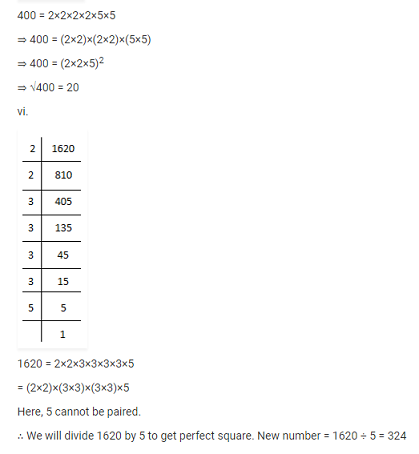
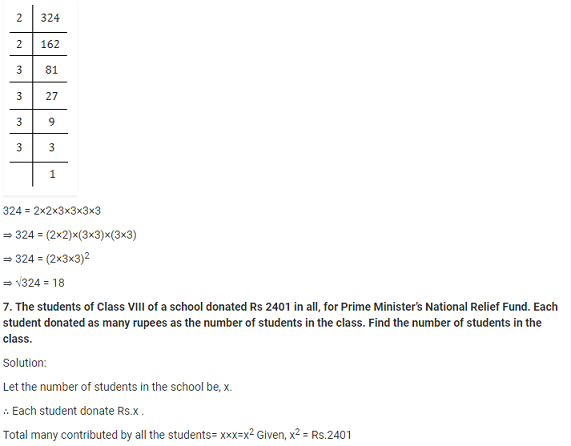

x2 = 7×7×7×7
⇒ x2 = (7×7)×(7×7)
⇒ x2 = 49×49
⇒ x = √(49×49)
⇒ x = 49
∴ The number of students = 49
8. 2025 plants are to be planted in a garden in such a way that each row contains as many plants as the number of rows. Find the number of rows and the number of plants in each row.
Solution
Let the number of rows be, x.
∴ the number of plants in each rows = x.
Total many contributed by all the students = x × x =x2
Given,
x2 = Rs.2025
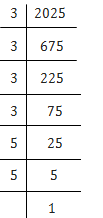
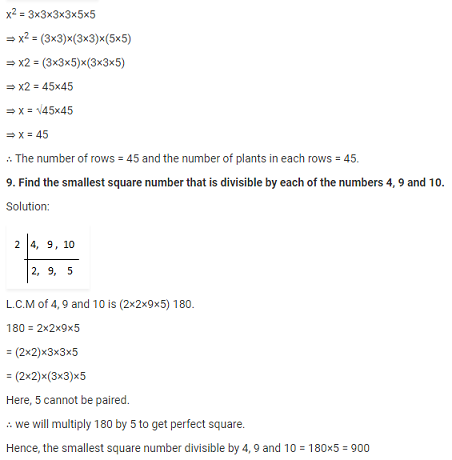
10. Find the smallest square number that is divisible by each of the numbers 8, 15 and 20.
Solution:

L.C.M of 8, 15 and 20 is (2×2×5×2×3) 120.
120 = 2×2×3×5×2
= (2×2)×3×5×2
Here, 3, 5 and 2 cannot be paired.
∴ We will multiply 120 by (3×5×2) 30 to get perfect square.
Hence, the smallest square number divisible by 8, 15 and 20 =120×30 = 3600